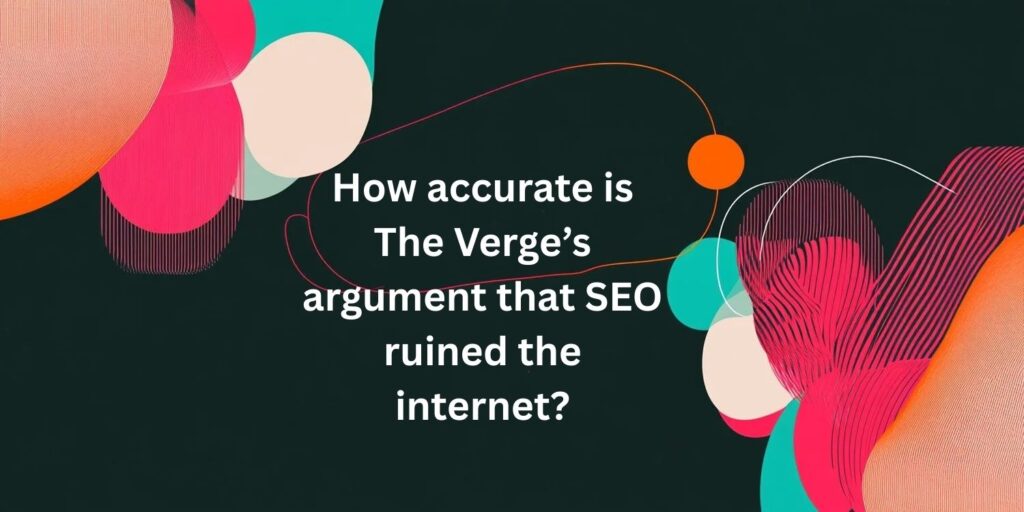The Publication That Lost Its Credibility for Clout!
So, The Verge decided to grace us with an 8500-word masterpiece, claiming SEO ruined the internet. Bravo on the attempt, but let's dissect this drama queen performance, shall we?
I realize that I am late to the party but that’s only because the ruined internet wouldn’t let me find The Verge’s article that stirred the buzz! (Just kidding!)
“After all, a lot of folks are unhappy, in 2023, with their ability to find information on the internet, which, for almost everyone, means the quality of Google Search results.”
Hold on a second. "Almost everyone" is a hefty claim! I'd prefer to rely on credible research or a survey before drawing such conclusions. Amanda Chicago Lewis, however, seems content linking to five articles—three of which are from The Verge—to fortify her argument.
The article seriously lacks substance. The author goes from straightaway bashing SEOs for playing with the internet quality to blaming AI to blaming Google to sounding confused in her own plot. The entire write-up reads like a confused teenager’s journal that uses absurd phrases, like alligator, content goblin, and pirate-shit, in an attempt to sound sassy.
Professionalism took a backseat, especially when misquoting became a recurring theme in this piece.
But wait, is the internet truly ruined?
A quick scan through a one-and-half-year-old article by Surge AI on “Is Google Search Deteriorating?” would tell you how it is done. “Google search results feel worse now than before” - is it enough of a measure?
No!
Coming to the question of whether the internet is ruined at all—do watch this video here.
Google’s UI has changed a lot throughout the years since 2006, with consistent evolutions in algorithms. Google’s aim has been to provide users with more curated search results, but also to generate revenue through ads.
Hence, one can argue that ads loading up at the top when you search for any keyword might compromise the search experience for some. But how much is SEO to be blamed here? As an SEO, I speak here for the whole community that we only try to bring up the quality of the content and websites to make the results more valuable and handy for users.
“Ray reassured me that I was not crazy. Google results today do feel different from how they felt just five or six years ago for two major reasons.”
Different, not worse.
How much onus is on SEO?
Blackhat SEO, the stuff of legends, is supposedly a relic of the past, thanks to Google's algorithms evolving like a superhero origin story. So, the majority of the arguments presented by the author are based on practices of yesteryear.
Today, SEOs focus on quality content, well-optimized webpages, and visual elements to make the search results more relevant and easy to consume, which is rewarded by Google in ranking.
I am not insinuating that there aren’t challenges, there are.
However, by optimizing websites and their elements, an SEO consultant does their best to improve the quality of a search result. Furthermore, the optimization also ensures there’s less carbon emission due to an overload of data and webpage loading time.
We tighten our grip on content and hosting services, sparing servers from overload, reducing energy consumption, and minimizing the website’s carbon footprint—all of it while keeping the quality of website elements and user experience on point.
SEO practices, such as reducing the website loading time, matching content with search intent, adding all the necessary information and cutting off the fluff, breaking the content into readable chunks of paragraphs, optimizing the headings and subheadings, fixing the websites technically, etc. only aim for improved quality.
There’s no rulebook that you can abide by. It takes practice and expertise to eventually know your way around ranking a page on Google. And no—it’s not one size fits all. What worked for one website, might not work for another. But how does an SEO know what would work or what not? The expertise & the skill! If resorting to unethical practices was the answer, no brand would need an SEO.
The Verge Needs to Do Better
The Verge's attempt felt like clickbait, a pitiful SEO-bashing endeavor. The irony? The publication dances in the same SEO ballet it criticizes, doing the very things it condemns.
The call here is for a more nuanced discussion, devoid of clickbait tendencies.
So here's a humble suggestion for The Verge: next time, let's aim for a discussion that goes beyond clickbait, acknowledging the internet's evolution, the positive contributions of ethical SEO practices, and valuable suggestions to improve the internet even further.

